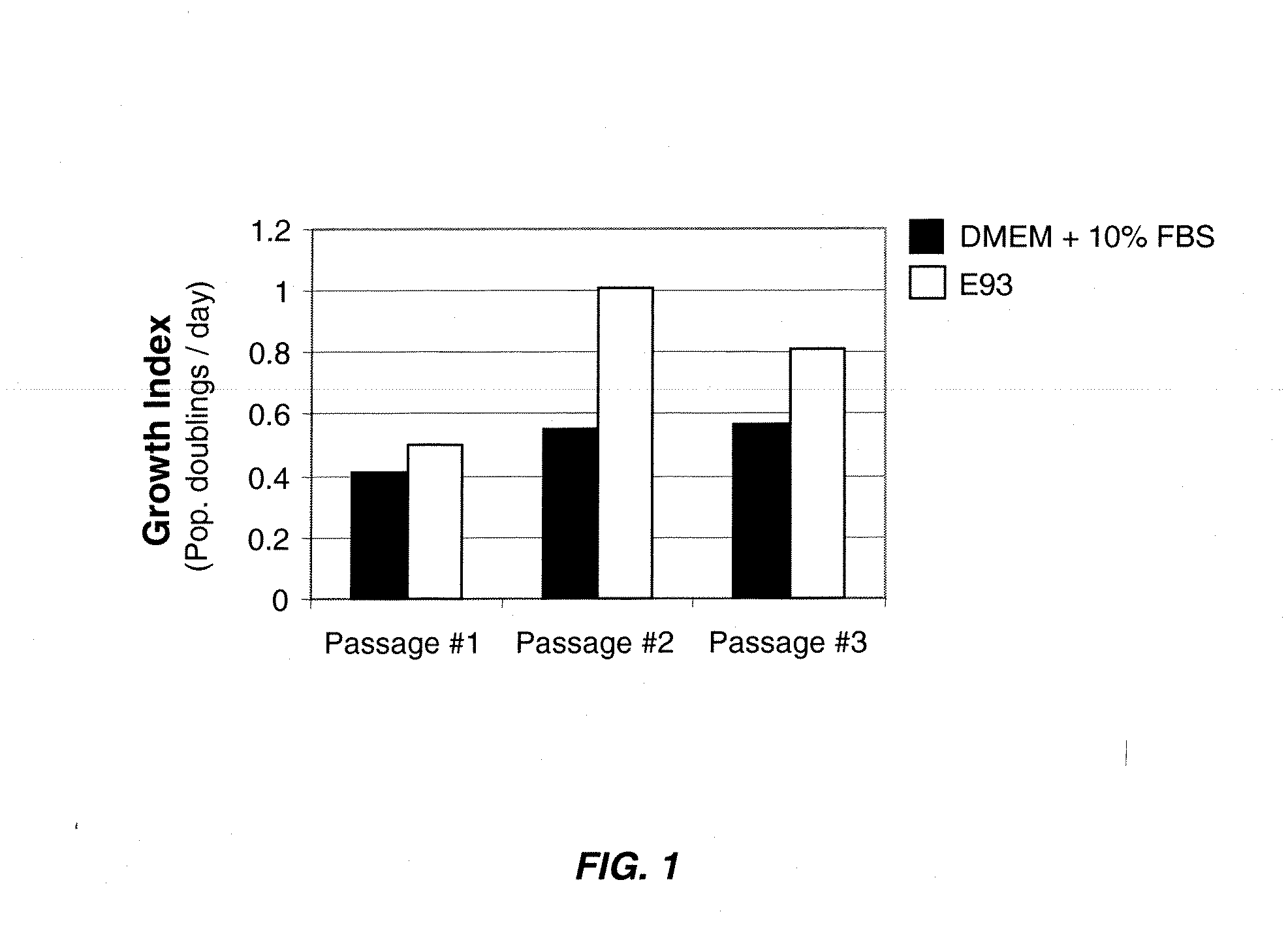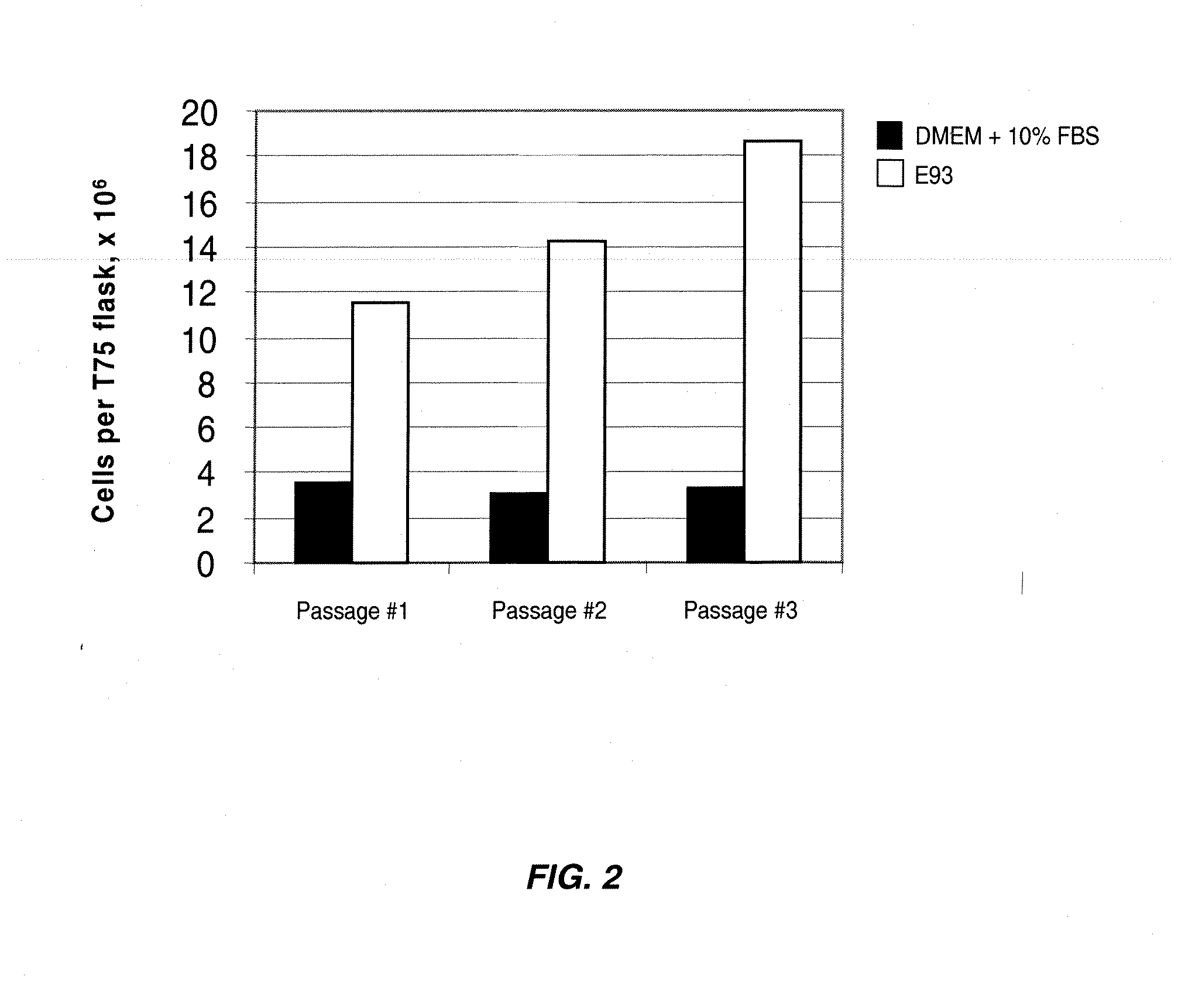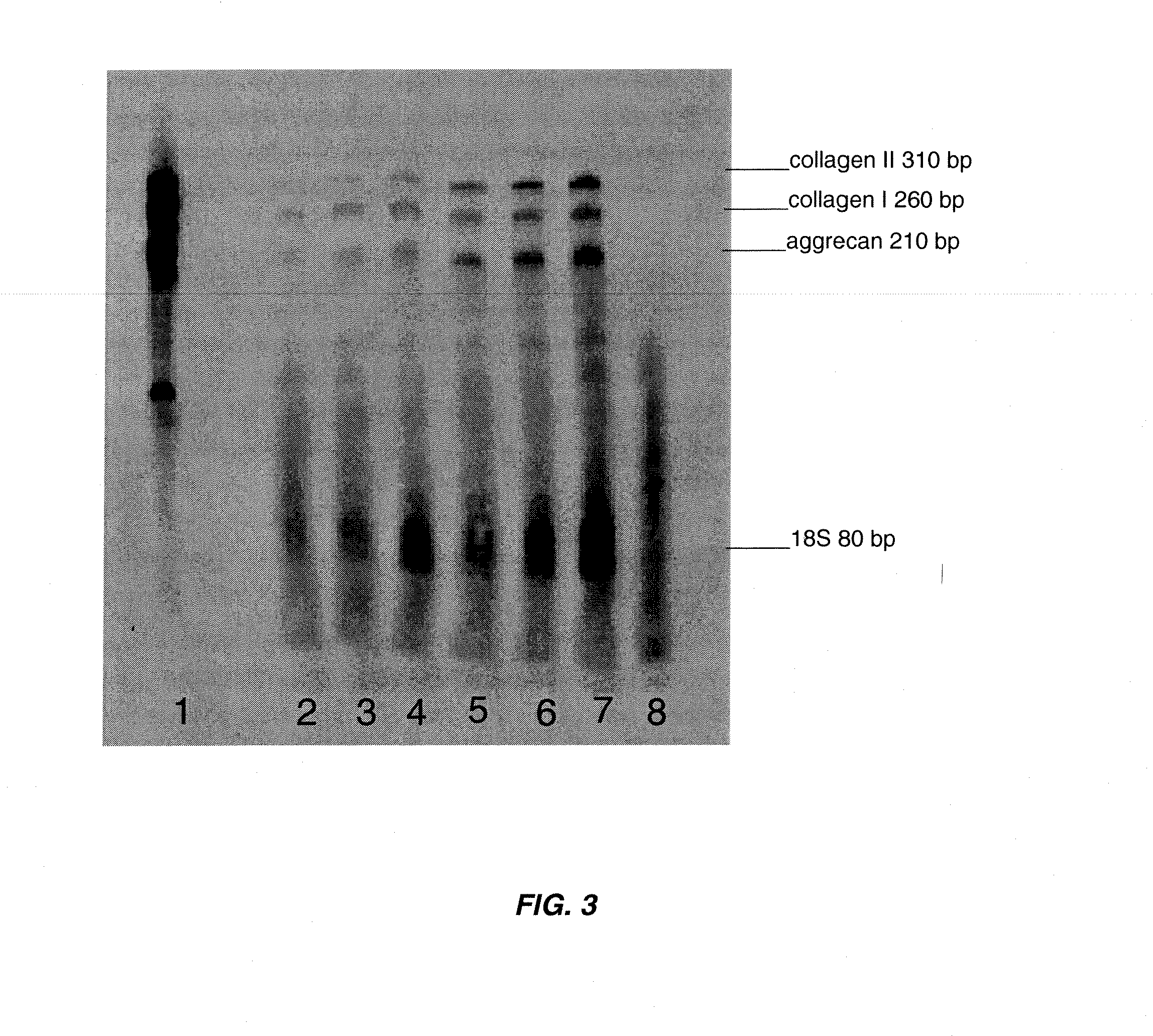Serum-free media and their uses for chondrocyte expansion
a chondrocyte and serum-free technology, applied in the field of cell and tissue culture, can solve the problems of difficult control, limited amount of starting cell material available for autologous chondrocyte implantation, and physical debilitation, and achieve the effects of promoting cell proliferation, enhancing cell attachment and proliferation, and maintaining the capacity of chondrocytes
- Summary
- Abstract
- Description
- Claims
- Application Information
AI Technical Summary
Benefits of technology
Problems solved by technology
Method used
Image
Examples
example 1
IL-6 Increases Cell Yield and Proliferation of Primary Human Chondrocytes
[0084] Primary human chondrocytes were isolated from biopsies of articular cartilage by mincing of the sample followed by enzymatic digestion with 0.25% protease type XIV (Streptomyces griseus) for one hour and then 0.1% collagenase overnight at 37° C. Cells were recovered by centrifugation for five minutes at 1,000×g and resuspended in the appropriate test medium. Cells grown in DMEM+10% FBS were plated at a density of 3,000 cells per cm2 and cells grown in serum-free medium were plated at a density of 5,000 cells per cm2. T75 flasks were used for all experiments. The following media were tested: [0085] 1) DMEM+10% FBS [0086] 2) cDRF / P / L as defined in Table 8 [0087] 3) cDRF / P / L as defined in Table 8, supplemented with 0.2 ng / ml IL-6 [0088] 4) cDRF / P / L as defined in Table 8, supplemented with 1.0 ng / ml IL-6
[0089] Cells were passaged upon reaching 50% to 80% confluence. Cells grown in DMEM+10% FBS were rinsed ...
example 2
OSM Increases Cell Yield and Proliferation of Primary Human Chondrocytes
[0092] Primary human chondrocytes were isolated from biopsies of articular cartilage by mincing of the sample followed by enzymatic digestion with 0.25% protease type XIV (Streptomyces griseus) for one hour and then 0.1% collagenase overnight at 37° C. Cells were recovered by centrifugation for five minutes at 1,000×g and resuspended in the appropriate test medium. Cells grown in DMEM+10% FBS were plated at a density of 3,000 cells per cm2 and cells grown in serum-free medium were plated at a density of 5,000 cells per cm2. T75 flasks were used for all experiments. The following media were tested: [0093] 1) DMEM+10% FBS [0094] 2) cDRF / P / L as defined in Table 8 [0095] 3) cDRF / P / L as defined in Table 8, supplemented with 0.1 ng / ml OSM [0096] 4) cDRF / P / L as defined in Table 8, supplemented with 0.5 ng / ml OSM [0097] 5) cDRF / P / L as defined in Table 8, supplemented with 1.0 ng / ml OSM
[0098] Cells were passaged upon r...
example 3
LIF Increases Cell Yield and Proliferation of Primary Human Chondrocytes
[0100] Primary human chondrocytes were isolated from biopsies of articular cartilage by mincing of the sample followed by enzymatic digestion with 0.25% protease type XIV (Streptomyces griseus) for one hour and then 0.1% collagenase overnight at 37° C. Cells were recovered by centrifugation for five minutes at 1,000×g and resuspended in the appropriate test medium. Cells grown in DMEM+10% FBS were plated at a density of 3,000 cells per cm2 and cells grown in serum-free medium were plated at a density of 5,000 cells per cm2. T75 flasks were used for all experiments. The following media were tested: [0101] 1) DMEM+10% FBS [0102] 2) cDRF / P / L as defined in Table 8 [0103] 3) cDRF / P / L as defined in Table 8, supplemented with 0.1 ng / ml LIF [0104] 4) cDRF / P / L as defined in Table 8, supplemented with 0.5 ng / ml LIF [0105] 5) cDRF / P / L as defined in Table 8, supplemented with 2.0 ng / ml LIF
[0106] Cells were passaged upon r...
PUM
| Property | Measurement | Unit |
|---|---|---|
| concentration | aaaaa | aaaaa |
| molecular weight | aaaaa | aaaaa |
| concentration | aaaaa | aaaaa |
Abstract
Description
Claims
Application Information
 Login to View More
Login to View More - R&D
- Intellectual Property
- Life Sciences
- Materials
- Tech Scout
- Unparalleled Data Quality
- Higher Quality Content
- 60% Fewer Hallucinations
Browse by: Latest US Patents, China's latest patents, Technical Efficacy Thesaurus, Application Domain, Technology Topic, Popular Technical Reports.
© 2025 PatSnap. All rights reserved.Legal|Privacy policy|Modern Slavery Act Transparency Statement|Sitemap|About US| Contact US: help@patsnap.com



